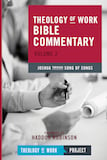God Bestows His Blessing of Productivity Through Human Labor (Ruth 2:5-7)
Bible Commentary / Produced by TOW Project
God’s faithfulness underlies human productivity, but people have to do the actual work. This was God’s intent from the beginning (Genesis 1:28, 2:5, 2:15). Ruth was eager to work hard to support herself and Naomi. “Let me go to the field,” she implored, and when she was given a chance to work, her co-workers reported that “she has been on her feet from early this morning until now, without resting even for a moment” (Ruth 2:7). Her work was exceptionally productive. When she came home after her first day at work and beat out the barley from the stalks, her harvest yielded a full ephah of grain (Ruth 2:17). This amounted to approximately five gallons of barley.[1] Both God and Boaz commended (and rewarded) her for her faith and industry (Ruth 2:12, 17–23; 3:15–18).
Practical tools on getting through a season of unemployment (Click to listen) |
In greater or lesser degree, we are all vulnerable to circumstances that make it difficult or impossible to earn a living. Natural disaster, layoff, redundancy, prejudice, injury, illness, bankruptcy, unfair treatment, legal restrictions, language barriers, lack of relevant training or experience, age, sex, economic mismanagement by government or industry, geographic barriers, getting fired, the need to take care of family members, and a host of other factors can prevent us from working to support ourselves and the people who depend on us. Nonetheless, God expects us to work as fully as we are able (Exodus 20:9).
Even if we cannot find a job that meets our needs, we need to work to the highest degree we can. Ruth did not have a steady job with regular hours and a paycheck. She was anxious about whether her station in life would be enough to find “favor” (Ruth 2:12) in the workplace, and she could not necessarily expect to earn enough to feed her family. She went to work anyway. Many of the conditions we face today in unemployment and underemployment are deeply discouraging. If the lack of high-skilled jobs leaves us only what seem like menial opportunities, if discrimination prevents us from getting the job we are qualified for, if circumstances prevent us from getting the education we need for a good job, if conditions make work seem hopeless, Ruth’s example is that we are called to work nonetheless. Our work might not even earn any income at first, be it volunteering to help others, caring for family members, getting education or training, or caring for our homes.
Practical tools for launching a successful job search (Click to listen) |
The saving grace is that God is the power behind our work. We do not depend on our own ability or the circumstances around us to provide for our needs. Instead we work faithfully as we are able, knowing that God’s faithfulness to his promise of fruitfulness is what gives us confidence that our work is worthwhile, even in the most adverse situations. We are seldom able to see in advance how God can make use of our work to fulfill his promises, but God’s power extends far beyond what we can see.







